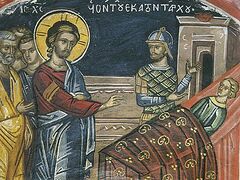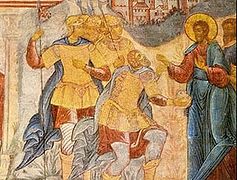And when Jesus was entered into Capernaum, there came unto him a centurion, beseeching him, and saying, Lord, my servant lieth at home sick of the palsy, grievously tormented. And Jesus saith unto him, I will come and heal him (Matt. 8:5–7)
The leper approached Jesus upon His descent from the mountain, but this centurion upon His arrival to Capernaum. Why didn’t either of them ascend the mountain? Not out of laziness, because they both had fiery faith, but rather in order not to interrupt His teaching. The centurion came to Him and said, “My servant lies at home sick of the palsy, grievously tormented.” Some say that he was making a justification as to why he did bring the servant himself.
It was not possible, they say, to bring a paralyzed man who was tormented and on his last breath. And we read testimony to the fact that the boy was on his last breath in Luke: and ready to die (Lk. 7:2). But in my opinion, this indicates the great faith of the centurion—even greater than that of those lowered (the paralytic) through the roof. He knew clearly that His command was sufficient to make the sick one arise from his bed, and so considered it superfluous to bring him there. So, what does Jesus do? He does something He never did before. In all the other cases He complied with the petitioners’ requests. But here He Himself forestalls the centurion’s wish and promises not only to heal the servant, but also to come to his house.
He does this in order that we would know about the centurion’s virtue. If he hadn’t promised this but only said, go, your boy will be healed, then we would have no idea of his virtue. He did the same thing, albeit in an opposite manner, with the Phoenician woman. Here, without any invitation, He voluntarily promises to come to his house, so that you would know about the centurion’s faith and great humility. He refuses the Phoenician woman's gift, and as if gives no hope to her expectation. Like a perspicacious doctor, He knows how to produce opposite from opposite.
Thus, here, the centurion's faith is revealed through the voluntarily promised visit, while there the woman’s faith is revealed through a lengthy postponement and refusal. He did the same with Abraham, saying, Shall I hide from Abraham what I am about to do? (Gen. 18:17), so that you would know about His love and care for the Sodomites. Thus also does the emissary to Lot refuse to enter his house, so that you would know about the greatness of this righteous man’s hospitality.




